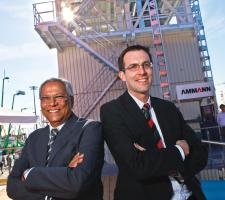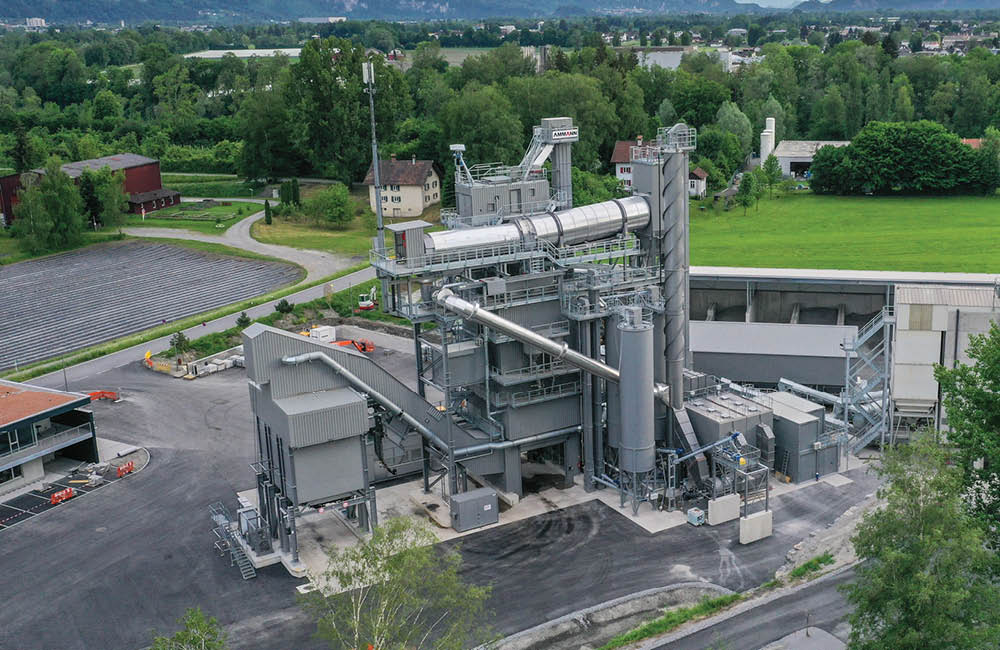
Hans-Christian Schneider followed a family tradition when he took over as chief executive officer of the Ammann Group in January. Previously deputy CEO, by assuming overall responsibility for the group he extended the tradition followed over the past 144 years by this Swiss family and company into the sixth generation. Schneider intends to continue to pursue Ammann’s well-established corporate strategy, which aims to see the group pursue its expansion strategy to grow from an international to a global provider of road construction equipment.
An early move as CEO has seen Schneider preside over a joint venture agreement with Gujarat Apollo Industries Limited (GAIL), India’s market leader in the field of road construction equipment. The investment heralds the entry of the
This was sealed at the recent bauma 2013 construction equipment event in Munich, Germany shortly after the first asphalt mixing plants were being assembled at the new Ammann plant in Gravataí in the southern Brazilian metropolis of Porto Alegre.
“We plan to produce several dozens of asphalt mixing plants of the Prime 140 type at the plant each year alongside pavers and compaction machinery. The Brazilian unit is responsible for marketing the entire product range in Latin America, that is from Mexico across the entire Caribbean to Tierra del Fuego at the southernmost tip of Argentina, and will also provide customer care through its own service team,” said Schneider.
Based in Langenthal, a small municipality that is an educational, cultural and economic centre in the district of Oberaargau in the canton of Bern in the north of Switzerland, Ammann was founded in 1869 by Jakob Ammann.
Indeed, in 1908, when Swiss physician Dr Ernest Guglielminetti completed what is believed to be the first section of machine laid road using a mix of viscous tar and gravel, Ammann Group first moved into the road construction market when it developed the first continuous ballast coating plant. The company, which mostly produced agricultural equipment at that time, worked on the patented design with Zurich Canton director for roads Heinrich Aeberli.
The first trials of material produced by the Ammann machine were carried out on Jurastrasse in the company’s home town of Langenthal and for many years the road was more commonly called the Macadam Road (after the Scottish roadbuilder John McAdam).
By the late 1930s Switzerland had over 8,000km of tarred roads but the aggregates for their construction had to be imported for the base course as locally sourced materials were not suitable. Aeberli started to research the binding of local aggregates into the tar so that they could be used to reduce the cost.
Aeberli was also instrumental in developing techniques for keeping tar coated aggregates warm for as long as possible before laying.
In addition to developing the first continuous ballast coating plant, Ammann also developed its own range of asphalt paving equipment but later stopped production to concentrate on mixing technology.
One of Ammann’s early machines was powered by a 27hp (27kW) Lister engine which operated at 1,000rpm and had two forward and one reverse gear. The machine could surface variable widths between 2.4-3.6m and weighed 8tonnes.
Today, the Ammann Group manufactures asphalt and concrete mixing plants together with the respective control systems as well as compaction machines and pavers for roadbuilding.
Hans-Christian Schneider took over as CEO from Ulrich Meyer, who has been in charge of the Ammann Group since September 2010. Ulrich Meyer is now on the board of directors of the group.
Schneider studied engineering at Ecole Polytechnique Fédérale de Lausanne, Switzerland from 2000-2006 and completed additional training in the management field at INSEAD, one of the world’s leading and largest graduate business schools.
In 2009 he was appointed assistant to group management at the Ammann Group and had been deputy CEO of the group since January 2012 and a board member since 2010. He remains on the board of directors.
Hans-Christian Schneider is the son of Johann N. Schneider-Ammann, the fifth-generation family member who was in charge of the company for 29 years until his election to the Swiss government in September 2010 required his departure.
A company statement at the time of his appointment said: “The Schneider-Ammann and Ammann families and the board of directors are delighted that this venerable Swiss company will remain under the management of a family member.
“Over the past 144 years this Swiss family-owned company has successfully expanded its presence on the markets and manufactures its plants and machines at several locations in Europe, China and now also in Brazil.”
Employing some 2,900 people, its reported sales totalled CHF 910 million (€760 million) for 2012.
Indeed, under Schneider, Ammann’s investment in the joint venture with GAIL equates to around €44 million, and it will see two family-owned companies increasing their presence in the booming Indian construction market. After signing the agreement with Anil Patel, Apollo Group founder, chairman of
With two manufacturing facilities, a national sales network and more than 500 employees, Apollo is the market leader in asphalt mixing plants and asphalt pavers in India, and also exports products to South-East Asia and Africa.
“With eight manufacturing facilities in China, Brazil, India and Europe, around 30 subsidiaries worldwide and a sales and service network of 160 dealers and 30 agents, Ammann is a global player,” said Schneider.
“We see India as an emerging market with huge potential. The Indian authorities are planning to significantly invest in a comprehensive infrastructure programme over the next 10 to 20 years.
“The ‘fit’ with Apollo is ideal. We feel both organisations have similar outlooks, personalities, values and product lines. The joint venture provides a good sound base for future development.”
Anil Patel agrees that Ammann Apollo India is well positioned to capitalise on the infrastructure programme.
“Apollo is the dominant supplier in this sector with a major market share in India.”
Asked how he assessed the current state of the industry and if it will return to its previous levels, albeit greatly changed, Schneider said: “We believe that Europe will stay challenging for the next few years.
“Many emerging markets will be much more willing to go for infrastructure investments. We expect those markets to develop quite well.
“One of our main focuses is to be local. Even if the world is getting closer due to globalisation it is important to us to be close to our customers, with our sales organisation and our service support.
“We are very successful in our home market Switzerland as well as in Turkey, Australia, Russia and the CIS states.
“We see India and South America as regions of high potential. With our recent activities, founding of a joint venture in India and opening of an assembly facility in Brazil, we mark local presence.
“For regions such as Southern Africa and South-East Asia we have established local subsidiaries in the past two years.”
The Ammann Group also prides itself on research and development in which it is investing substantial amounts.
“We have based our own R&D division at the headquarters in Langenthal.
“Ammann has always been one of the innovation leaders in the industry and has proven this position impressively at bauma 2013 by presenting several innovations on plant as well as on the machine side,” said Schneider, although he admits that hybrid machine technology “is not in our focus yet.”
“Our latest developments and innovations were all shown at bauma where we had a lot of new plants and machines.
“For example, the Universal HRT, UniBatch, Prime 140 and EasyBatch 140 asphalt mixing plants and the asphalt finisher AFT 800, the first large-scale finisher from Ammann.
“We also introduced the tandem roller AVX 90 Ammann, our first ever 9tonne articulated roller within the scope of the new product range concept, a new development that rounds off the most comprehensive programme on the asphalt roller market and launches the most important product with regard to volume in global applications.
“And the ARP 95 pivot-steering tandem roller along with the APH 100-30 fully hydraulic vibratory plate, Ammann‘s most powerful vibratory plate.”
Looking to the challenges and goals for the future, he said: “On one hand, the main challenge is the low visibility of some, and especially the European markets. On the other hand, with the global growth strategy we aim to broaden our activities in the different market regions.”.RSS










